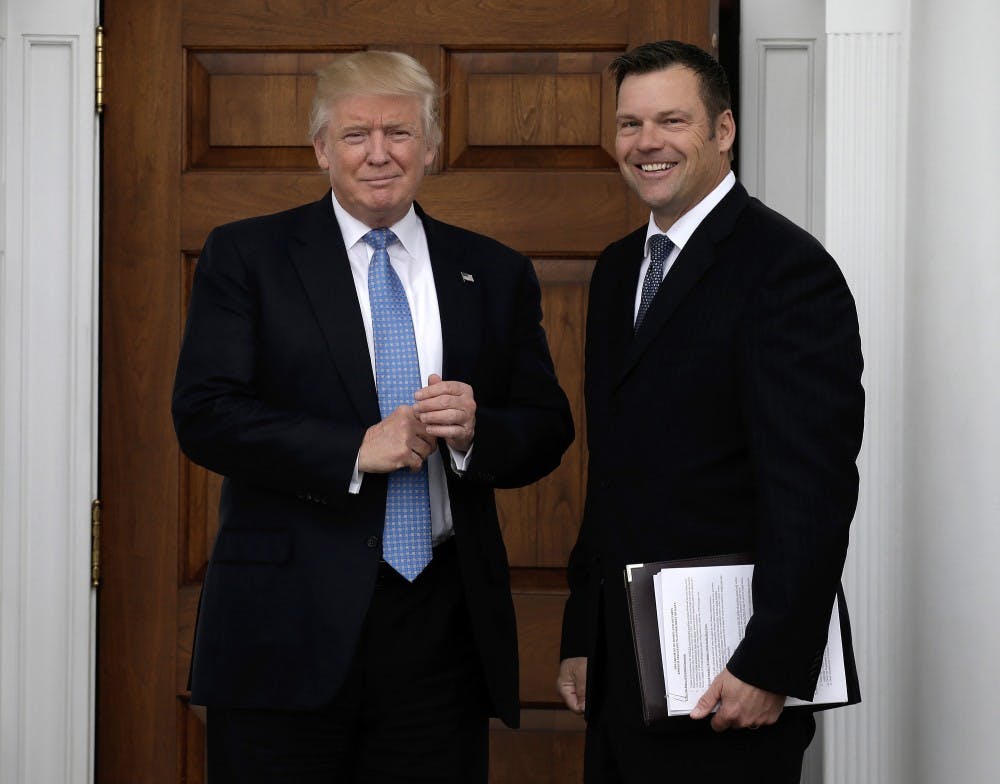The election integrity panel installed by President Donald Trump and headed by Kansas Secretary of State Kris Kobach has postponed a request to states seeking voter roles and sensitive individual voter data.
Alabama's response to that commission's request, however, is unlikely to change.
Kobach, who vice chairs the commission, said in a federal court filing Monday that staff had sent letters to ever secretary of state, instructing them not to submit any sensitive voter data to the commission for now.
The Alabama Secretary of State's Office received that letter Monday, Secretary of State John Merrill confirmed. The letter — sent by Andrew Kossack, the federal officer assigned to the president’s Commission on Election Integrity — said the commission would send further instruction after a court rules on a lawsuit over the commission's voter probe.
In the meantime, the U.S. District Court for the District of Columbia is considering a request for a temporary restraining order filed against the request — a probe many secretaries of state across the country have labeled as a potential violation of voters' privacy.
Alabama's secretary of state said in a phone interview from a National Association of Secretaries of State convention that his office will not provide any voter data to the president's Federal Advisory Commission.
“We cannot, by law, give the information to them,” Merrill said, citing Alabama law that prevents the his office from turning over the sensitive data contained within Alabama’s lengthy voter rolls.
In particular, Kobach's Commission requested personal data like partial social security numbers, birth dates, military history, criminal records and driver’s license numbers.
So far, Arkansas's secretary of state is the only election official to comply with the request to send voter information to the commission, and he only sent a partial response. Most other states have denied the panel’s request; others have not answered at all.
Merrill said the commission could file a records request for copies of the public voter rolls but any more detailed information would not be handed over. The commission could only obtain the same information that is available to the general public.
“If they want to purchase it they can purchase it anytime they want because we’re not going to provide it to them voluntarily or for free,” Merrill said.
A full print out of the publicly available voter rolls would cost upward of $32,000, Merrill said, considering that more than 3.2 million people are registered to vote in Alabama.
The court filing Monday is part of a complaint filed by the Electronic Privacy Information Center seeking a temporary restraining order to prevent states from turning over data. They say the commission's request -- if compiled into a database -- could put the nation's voter rolls at risk of hacking, manipulation and other nefarious possibilities.
And that isn't the only lawsuit against Kobach's voter info request. The American Civil Liberties Union also sued the Commission earlier in the day, alleging the commission is violating U.S. law that requires transparency in government. Several other lawsuits were also filed Monday by other plaintiffs.
Arkansas' preliminary data submission was sent to a secure server in Alabama, at Redstone Arsenal in Huntsville. But Kobach's filing Monday said the commission would no longer use the Huntsville data center. That comes after the plaintiffs in the lawsuits sought to add the Department of Defense as a defendant in the case.
Kobach said the commission didn’t want the case to interfere with other agencies’ access to the SAFE server.
Arkansas’ files won’t be downloaded by the commission, according to the court filings. The files will be deleted for the time being until the court rules on the case. If the judge gives the go-ahead, the sensitive voter data will instead be held on a secure White House server that was set up Monday evening.
Like Alabama, many states that didn’t flat-out reject the request said the commission could purchase public data but that could come at a mounting cost. Wyoming's secretary of state said their full voter roll could cost more than $12,000. Larger states could cost even more.
However the federal court case turns out, it likely won’t change the responses from the secretaries of state across the U.S. because of fundamental issues with the data request, which is part of the commission's inquiry into alleged voter fraud.
Merrill, a Republican, said he was “disappointed” with the way Kobach handled the data request.
"Chris is very very smart, but he didn’t handle this very well,” Merrell said. “It put a lot of people in a defensive posture who never should have been put in a defensive posture, including people on the Commission who did not know he was sending the letter that had already been distributed.”
Even Kobach’s home state of Kansas said it won’t turn over data to the commission because Kansas state law prohibits it.
Even if the commission does purchase full voter rolls from states across the country, the publicly available data may not be much help, which is likely why Kobach's commission made special requests to the states individually.
“What they can get from Alabama won’t really help them a whole lot if they’re trying to identify people who might be voting twice or be registered twice because they can’t get enough information to properly or adequately cross reference them in such a way that would really help them accomplish their goal,” Merrill said.
Specific identifiers like social security numbers or driver's license numbers would be needed to properly cross-reference voter registration because there could be several legitimate voters with the same name and birth dates across the country.
But the plaintiffs in the lawsuits say turning those numbers over as the commission has requested could violate voters’ privacy, putting voters at risk. The pros of cracking down on rare instances of voter fraud may not outweigh the possible risks, the plaintiffs say.
Almost all secretaries of state questioned about possible voter fraud have fiercely swatted away allegations of voter fraud, and elections experts say that voter fraud is extremely rare. Democratic officials have suggested the commission, which was started in May, is tactic to introduce voter suppression tactics.
Merrill said he has “absolute confidence” in Alabama’s elections system.
“I can’t speak for other states, but I have a lot of confidence in the people who are in those roles that they’re doing all they can,” he said.
Do you like this story? The Plainsman doesn't accept money from tuition or student fees, and we don't charge a subscription fee. But you can donate to support The Plainsman.

Chip Brownlee, senior in journalism and political science, is the editor-in-chief of The Auburn Plainsman.





